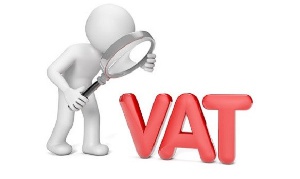Business News of Saturday, 3 August 2019
Source: thefinderonline.com
VAT – How it affects the Ghanaian economy
Commissioner-General of Ghana Revenue Authority (GRA) has been tasked to collect GH? 57.8 billion this year and this is a herculean task considering the fact that the Authority could not exceed its target for the year 2018.
Value Added Tax (VAT) is a consumption tax and, therefore, very easy to collect as compared with Corporate tax. VAT is charged on the supply of goods or services where the supply is a taxable supply and the supply is made by a taxable person in the course of a taxable activity of a person in accordance with Section 1 (2) of the Value Added Tax Act, 2013, Act 870.
A taxable person as per Section 4 (1) of Act 870 is a person who is registered for purposes of this Act or is required to register under Section 6 to 16 and a ‘taxable activity” means an activity which is carried on by a person (a) in the country, or (b) partly in the country, whether or not for a pecuniary profit, that involves or is intended to involve, in whole or in part, the supply of goods or services to another person for consideration.
This implies that VAT has to be charged even if the taxable activity is not for profit. For example, if you consume some of the products which you sell, you are required to compute the VAT and pay same to GRA and this is in accordance with Section 5 (2)g of Act 870.
A taxable activity includes the following;
• An activity of a local authority or unincorporated association or body that involves, in whole or in part, the supply of goods or services to another person for consideration
• The processing of data or supply of information or similar service
• The supply of staff
• The sale, transfer, assignment or licensing of patents, copy rights, trademarks, computer software and other proprietary information
• The appropriation of goods or services for personal use or consumption by the taxable person or by another person.
Tax revenue mobilization can be maximized when tax officials apply the laws strictly unlike corporate tax which is a bit cumbersome.
Corporate tax is paid when persons make chargeable income and therefore it is not automatic that tax revenue shall be mobilized.
Persons liable to pay
Section 2 (1) of ACT 870 stipulates that “except as otherwise provided in this Act, the tax shall be paid (a) in the case of a taxable supply, by the person making the supply; (b) in the case of an import of goods, by the importer; or (c) in the case of an import of services, by the recipient of the service.
With regard to persons who make supplies, they are expected to issue VAT invoices to their customers who will pay the VAT component to them. They then make the payments to the GRA and that explains why the onus of the tax payment rests with them.
In the case of an importer, the VAT is paid at the point of entry and for imported service, the beneficiary of the service pays. For example, if a person imports software from a non – resident person, the VAT shall be paid by the importer of the service but can be claimed subsequently as part of her input VAT.
It is worthy of mention that the National Health Insurance Levy (NHIL) and Ghana Education Trust Fund (GETFUND) have now become levies and are added to the prices of goods and services before VAT is computed on the total amount.
Challenges of collection of VAT in Ghana
Despite the fact that VAT is easy to collect, GRA has not been able to maximize its revenue mobilization due to the following reasons;
• Failure by qualified persons to register for VAT
There are many businesses whose thresholds exceed the amount required for the registration do not register and as a result, they do not charge VAT. This leads to loss of revenue to the state and it is difficult to track their sales because they refuse to even register their businesses with GRA.
• Failure to issue VAT invoices
Some persons who are VAT registered refuse to issue VAT invoices and they always let their clients know that issuing a VAT will lead to a higher price for their goods or services. Customers or clients who are unpatriotic also collude with these persons and therefore avoid paying the VAT.
• Refusal of State – Owned - Enterprises (SOEs) to pay the VAT components of invoices issued
Most SOEs refuse to pay the VAT components of invoices issued to them and the reason they give is that they are exempt from the payment of VAT. Most often than not, the persons that submit the invoices use their monies to pay the VAT because of the fear of being sidelined in the award of contracts. The result is that their working capital is reduced and can eventually cripple their operations.
• Corruption
Some tax officials assist persons who collect VAT to evade the payment of the VAT and the persons are happy because the monies that have been collected are shared amongst the officials and the persons engaged in taxable activity.
Recommendations
• GRA must liaise with the Registrar General Authority to be able to track persons who ought to register with GRA. This can be done when they get their registration documents and financial statements. The Tax Identification Number (TIN) of the Company as well as those for the Directors will make it easier to get information about the companies and get them to comply with the tax laws.
The penalties for non – compliance of the law should be adhered to strictly to serve as a deterrent to potential persons who may want to evade payment of the tax.
• GRA must monitor the activities of persons that carry on taxable activity and those found to be non- compliant brought to book. Regular checks and tax audits can help to minimize the loss of tax revenue due the country.
• SOEs must be made to appreciate the fact if they are not exempted from the payment of taxes, they ought to comply with the law. Their posture poses a threat to their operations and that can affect the country’s growth and development and therefore, our gross domestic product (GDP).
• Corrupt tax officials must be dealt with severely to serve as a deterrent to others. Apart from their summarily dismissal, they must be handed over to the police for prosecution.
The Commissioner - General must ensure that proper audit is conducted before VAT refunds are made.
• Tax education must be conducted regularly to help educate taxpayers with regard to our laws and the benefits if any.
It is my hope that the recommendations will be implemented so that the growth of 7.6% envisaged in the 2019 budget will be achieved.











